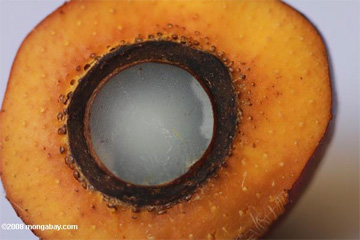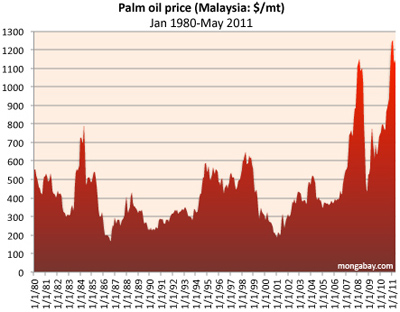To encourage uptake of palm oil that is less damaging to the environment, the European Union (EU) should lift the import duty on palm oil certified under Roundtable on Sustainable Palm Oil (RSPO), said a Dutch industry group.
The Dutch Product Board for Margarine, Fats and Oils (MVO), a group that has already committed to sourcing 100 percent of its palm oil demand to RSPO-certified suppliers by 2015, called upon the E.U. to abolish the 3.8 percent duty on crude palm oil imported into Europe. The group says lifting the duty would help offset the additional costs of producing certified palm oil.
MVO’s call was immediately supported by the RSPO, a multistakeholder body that sets criteria for ‘sustainable’ palm oil production. Members of the RSPO include producers, processors, traders, manufacturers, retailers, and environmental and social NGOs.
 
|
“The Dutch industry initiative once again places the Netherlands, the largest palm oil importer and processor in Europe, at the forefront of spearheading market transformation towards sustainable palm oil,” said Darrel Webber, RSPO Secretary General, in a statement. “The RSPO commends and supports the MVO’s resolution aimed at stimulating demand for sustainable palm oil.”
“The RSPO looks forward to future opportunities for dialogue and cooperation with EU decision-makers regarding the proposal made by the MVO.”
The RSPO was formed in 2004 as a response to concern that oil palm expansion was driving deforestation in Malaysia and Indonesia, the countries that account for more than 80 percent of production. RSPO criteria include guidelines for avoiding conversion of high conservation value forest areas, treating waste products, reducing the use of fertilizers and pesticides, and interacting with local communities and workers.
While the RSPO has faced some criticism from environmentalists over its oversight and enforcement mechanisms, the group has recently censured some high profile members for failing to comply with its standards. In the meantime, RSPO sales have soared and now account for nearly 10 percent of global palm oil production.
Due to its high yield and low cost relative to other oilseeds, palm oil is widely used in processed food products, soaps, and cosmetics. In some markets, up to half of packaged proceeded foods may contain palm oil or palm oil derivatives.
Related articles